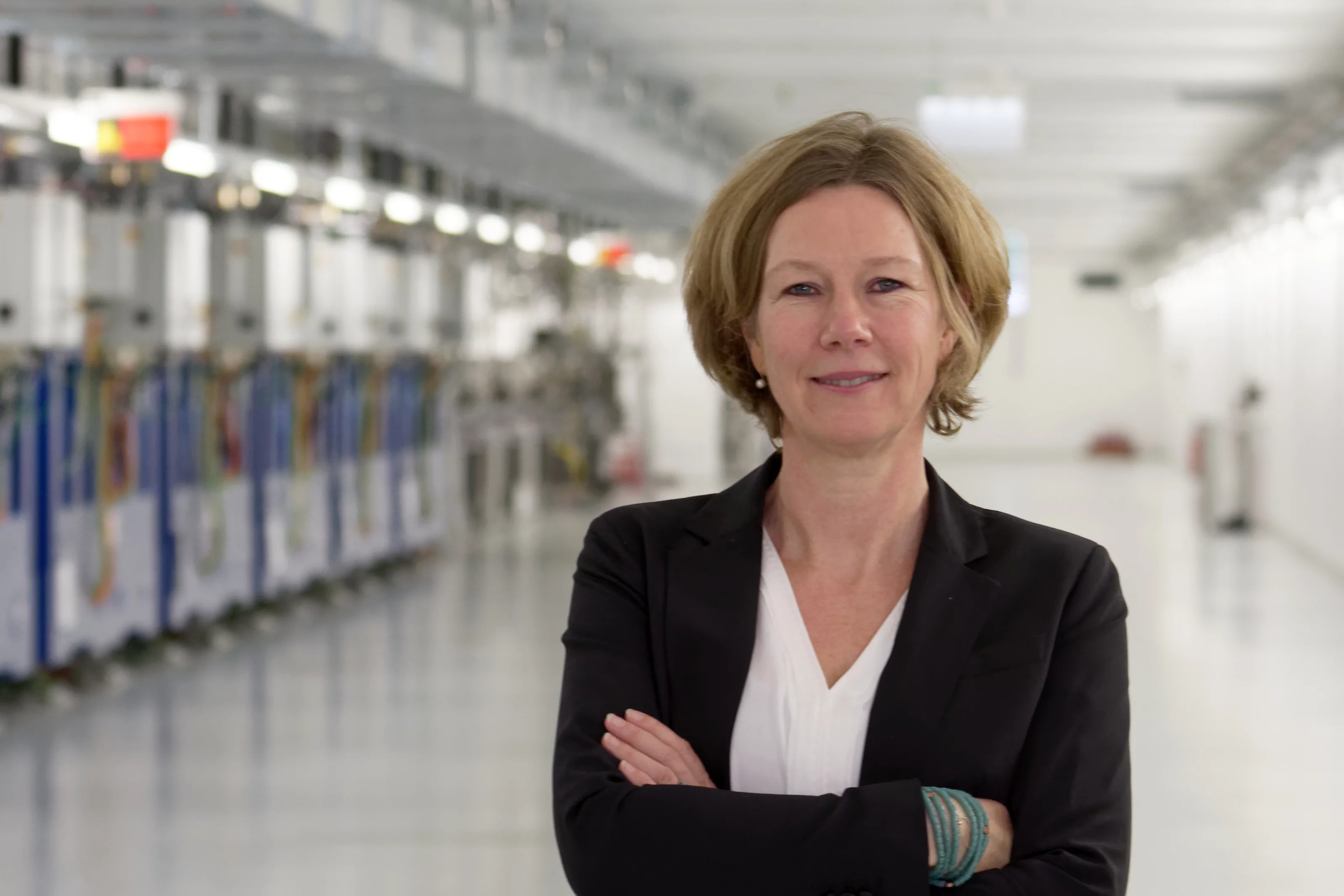Interview: Mirjam van Daalen
«SLS is something very special right now, across Europe»
The Swiss Light Source SLS is one of just a few facilities of its kind in Europe that are still in operation during these pandemic times. In an interview, Mirjam van Daalen, chief of staff of the Photon Science Division, emphasises how important international cooperation is these days.
Ms. van Daalen, among other things you do at PSI, you coordinate collaborations with other research facilities and research groups in Europe and around the world. What has changed for you since the Covid-19 pandemic broke out?
Mirjam van Daalen: Normally, I travel quite a lot as part of the projects. Now I'm sitting here at PSI, jumping from one Zoom videoconference to the next. And mostly it's just about the coronavirus. It really is a lot of work, but on the other hand, it is very nice to see how all the collaborators pull themselves together and work together.
What projects are involved?
One is Lightsources.org – a worldwide cooperation among institutions where research is conducted using synchrotron radiation and light from free-electron lasers. We keep each other up to date, for example when it comes to which facilities are still running and which could be quickly restarted for research relevant to the coronavirus.
Another example is LEAPS, the League of European Accelerator-based Photon Sources, a consortium of all European synchrotron radiation sources and free-electron lasers. Here too we give each other input, and we communicate jointly on this topic with the European Commission.
How does the status of the large research facilities at PSI compare to others in Europe at this time?
SLS is one of the few synchrotron light sources currently in operation in Europe. This is something quite special right now. The other facilities that are shut down now could be restarted relatively quickly if necessary. Just as is the case with SwissFEL. At SLS, however, we even postponed the planned Easter shutdown. We are keeping the facility open to address the societal challenge of the Covid-19 pandemic. After all, PSI has great potential to help solve the problem.
Why are synchrotron radiation sources important when it comes to research on Covid-19?
Because it is an excellent way to decode protein structures, for example on the MX beamlines of SLS. And if you know the structure of proteins, you can develop much more targeted drugs against the virus. In addition to its beamlines, PSI also offers expertise in protein crystallization methods and in the structural analysis of relevant antigens, as well as in X-ray imaging, for example, of lung tissue.
But theoretically, every research facility could do this on its own. Why international cooperation?
On the one hand, we are all actually in competition with each other, that's right. But we try to support each other anyway, especially during this pandemic. Each facility also has its special technical features and specialisations, so that the facilities complement each other. There are many areas in which we can work together and develop shared visions, for example to address global challenges such as Covid-19 or to jointly develop technologies that will then be useful for all facilities. Within LEAPS, we have developed a common, sustainable strategy at the European level.
And what is the current state of scientific collaboration on coronavirus research?
At the moment, we are collecting as much information as possible about what kinds of know-how we have, and how we can get results and share them with each other. For LEAPS, for example, we are currently working on a position paper on Covid-19. It is also about which facility in Europe offers which instruments and experimental techniques that other researchers can use.
Is there an exchange of measurement data at the international level?
Absolutely. Many national data banks are now working together. And some time ago, the European Commission launched the European Open Science Cloud EOSC to make it easier for European scientists to access scientific data and data processing platforms. The European Commission is now making extra grants available to set up a European data platform for SARS-CoV-2 and for coronavirus-specific data within the EOSC: everything needed to be able to quickly exchange data and statistics about Covid-19 in the current situation.
The European Commission has always promoted trans-European research collaborations. Has this intensified during the coronavirus times?
The EU has made extra money available for research on Covid-19. It is also explicitly calling on consortia like LEAPS to give their input. The European Commission expects research infrastructures to work together on this societal challenge. The Covid-19 pandemic shows how important research is in general, especially basic research. We couldn't solve this problem without it. In investigating Covid-19, we now benefit enormously from the know-how that our researchers have developed in the past, in techniques such as protein crystallography and the decoding of protein structures. Research is a cornerstone of our society, as is strikingly demonstrated by this pandemic.
Interview: Paul Scherrer Institute/Brigitte Osterath
Contact
Dr. Mirjam van Daalen
Chief of staff, Photon Science Division
Paul Scherrer Institute, Forschungsstrasse 111, 5232 Villigen PSI, Switzerland
Telephone: +41 56 310 56 74, E-Mail: mirjam.vandaalen@psi.ch [German, English, Italian, Dutch]

